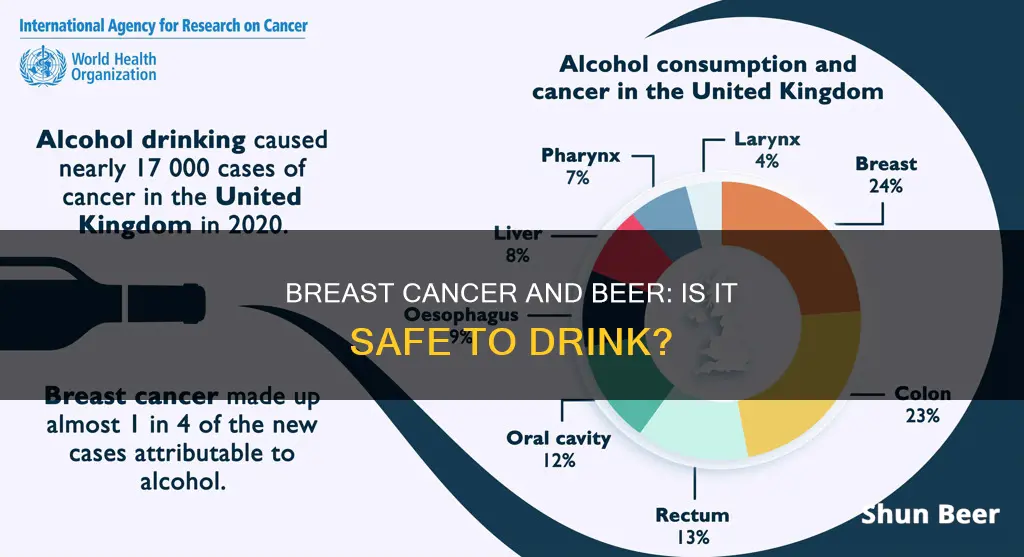
Alcohol consumption is linked to a higher risk of developing breast cancer. However, the link between alcohol consumption and breast cancer survival is less clear. While some studies suggest that drinking alcohol after breast cancer does not increase the risk of recurrence or death from the disease, other studies indicate that it may increase the risk of recurrence, particularly in postmenopausal and overweight/obese women. To reduce long-term cancer risk, it is generally recommended that alcohol consumption be limited to no more than one drink per day for women and two drinks per day for men.
| Characteristics | Values |
|---|---|
| Can drinking beer increase the risk of breast cancer? | Yes, studies have shown that alcohol consumption is associated with a higher risk of developing breast cancer. |
| Can breast cancer survivors drink beer? | There are conflicting views on this. Some studies suggest that moderate alcohol use after a breast cancer diagnosis won't lead to a lethal recurrence. However, it is still associated with an increased risk of developing a breast cancer recurrence or being diagnosed with a second breast cancer in the opposite breast. |
| Recommended alcohol consumption | It is recommended that women have no more than one alcoholic drink per day. |
What You'll Learn

Alcohol increases the risk of breast cancer
Alcohol intake has been linked to an increased risk of breast cancer. While not everyone who drinks alcohol will develop breast cancer, the risk increases even at low levels of alcohol consumption. The less one drinks, the more they reduce their risk.
More than 100 studies have examined the link between alcohol consumption and breast cancer risk in women. These studies consistently found an increased risk of breast cancer associated with alcohol intake. The American Cancer Society has also linked alcohol to cancers of the mouth, throat, larynx, esophagus, liver, colon, rectum, and breast. Research shows that the risk is "dose-dependent", meaning the more one drinks, the higher the risk becomes. One drink per day increases breast cancer risk by about 10%, and two drinks per day increase the risk by 20%.
There are several reasons why alcohol consumption may lead to breast cancer:
- Alcohol is empty calories and can lead to unwanted weight gain, which, in turn, can increase cancer risk.
- Alcohol can increase levels of estrogen and other hormones associated with breast cancer. Postmenopausal women who consume alcohol are at a higher risk of developing estrogen-receptor-positive (ER+) breast cancer, as studies have shown that alcohol increases estrogen levels in this group.
- Alcohol users tend to have higher levels of folic acid in their systems, which has been linked to increased cancer risk.
- Alcohol is broken down by the body into acetaldehyde, which can cause changes in DNA that trigger a response leading to cancerous cell development.
To reduce the risk of breast cancer, it is advisable to limit alcohol consumption to within the low-risk drinking guidelines and incorporate several drink-free days each week. Maintaining a healthy weight, not smoking, and engaging in physical exercise are also important factors in reducing the risk of breast cancer.
Appendix Surgery: Beer Drinking Timeline and Safety
You may want to see also

Alcohol consumption and breast cancer recurrence
Alcohol consumption is linked to an increased risk of breast cancer. However, the impact of alcohol consumption on breast cancer recurrence is less clear.
Alcohol and Breast Cancer Risk
More than 100 studies have found a link between alcohol consumption and an increased risk of breast cancer in women. While the exact mechanism is unknown, alcohol consumption may lead to breast cancer by:
- Causing weight gain, which is a risk factor for cancer.
- Increasing levels of estrogen and other hormones associated with breast cancer.
- Increasing folic acid levels in the body, which have been linked to a higher risk of cancer.
- Increasing levels of acetaldehyde, which is a known breast cancer risk factor.
Alcohol and Breast Cancer Recurrence
There is conflicting evidence regarding the impact of alcohol consumption on breast cancer recurrence. Some studies suggest that alcohol consumption after a breast cancer diagnosis does not impact the patient's prognosis or risk of dying from the disease. However, other studies have found that alcohol consumption can increase the risk of breast cancer recurrence, especially in postmenopausal and overweight/obese women. The discrepancy in findings may be due to differences in study design, sample size, and the adjustment for confounding variables.
Recommendations for Breast Cancer Patients and Survivors
Breast cancer prevention guidelines recommend that women have no more than one alcoholic drink per day. Patients undergoing active treatment are advised to avoid alcohol, as it can exacerbate side effects and adversely interact with cancer drugs. Breast cancer survivors should discuss alcohol consumption with their doctors, as there are currently no guidelines for this population. While moderate alcohol consumption may not significantly impact survival, it is essential to consider the potential risks and benefits.
Beer Drinking in the Middle Ages: A Medieval Times Guide
You may want to see also

Alcohol's impact on breast cancer treatment
Alcohol consumption is associated with a higher risk of developing breast cancer. According to the American Cancer Society, alcohol has been linked to cancers of the mouth, throat, larynx, esophagus, liver, colon, rectum, and breast. More than 100 studies have found a link between alcohol intake and an increased risk of breast cancer.
Alcohol use after breast cancer doesn't increase the chances of dying from the disease, but it does increase the overall cancer risk. It has been linked to an increased risk of developing a second breast cancer in the opposite breast. Alcohol consumption can also increase the risk of a breast cancer recurrence.
Breast cancer survivors who drank more than three to four drinks per week were at a higher risk for recurrence. Consuming three to four alcoholic drinks or more per week after a breast cancer diagnosis may increase the risk of breast cancer recurrence, particularly among postmenopausal and overweight/obese women.
The American Cancer Society's guidelines for cancer prevention recommend low to moderate drinking, meaning one or two drinks a day for men and one drink a day for women. Patients going through active treatment should avoid alcohol, as it can exacerbate side effects or adversely interact with drugs used in cancer treatment.
Beer Station on Carnival Fantasy: How Does It Work?
You may want to see also

Recommended alcohol consumption for cancer survivors
Alcohol consumption has been linked to an increased risk of developing several types of cancer, including breast cancer. Studies have shown that even moderate alcohol consumption can increase the risk of breast cancer, with the risk increasing in line with the amount of alcohol consumed.
For cancer survivors, the consumption of alcohol may increase the chances of their cancer returning. Alcohol can interfere with the normal functioning of cells, leading to DNA mutations and potentially causing a cancer recurrence. Additionally, alcohol's impact on the body's immune system can make it difficult for the body to detect and destroy cancer cells.
Despite these risks, cancer survivors can still choose to consume alcohol, but it is important to do so with caution and be aware of the potential dangers. There are no formal alcohol consumption guidelines specific to cancer survivors, but moderate drinking – typically defined as up to one drink per day for women and two drinks per day for men – is generally considered safe for the general population. However, it is important to note that "safe" does not mean "risk-free," and even at these consumption levels, there may still be small increases in cancer risk.
Cancer survivors should also be aware that alcohol can interact with certain medications and treatments, potentially reducing their effectiveness or causing increased side effects. Excessive drinking can also worsen symptoms like fatigue and depression, common complaints among cancer survivors, making it more challenging to cope with the stresses of recovery.
It is recommended that cancer survivors discuss their drinking habits with their healthcare provider to understand the risks and benefits and make an informed decision about alcohol consumption based on their health history. Alternatives to alcohol, such as non-alcoholic drinks, physical activities, mindfulness practices, and social engagement, can also be explored to support recovery and ongoing wellness.
Beer vs. Water: Can Beer Ever Be Healthy?
You may want to see also

Alcohol's effect on estrogen levels
Alcohol consumption has been linked to an increased risk of breast cancer in women. While drinking after a breast cancer diagnosis doesn't increase the chances of dying from the disease, it does increase the overall cancer risk.
Estrogen is the primary female sex hormone and plays a key role in regulating essential bodily functions such as menstruation, pregnancy, and menopause, as well as heart and blood vessel health, urinary tract health, and skin and hair health.
Alcohol can disrupt the delicate balance of estrogen in the body. When alcohol is consumed, the liver prioritizes metabolizing it over other functions, including hormone regulation. This can lead to fluctuations in estrogen levels, resulting in short- and long-term health effects.
- Disruption of regular menstrual cycles, leading to irregular periods or worsening menopausal symptoms.
- Reduced chances of pregnancy for women undergoing fertility treatment.
- Increased risk of breast cancer.
- Potential increase in estrogen levels due to the liver converting androgens to estrogen.
- DNA damage in breast cells, leading to mutations that contribute to cancer development.
- Weakening of the immune system, making it harder for the body to fight off cancer cells.
- Increased risk of high blood pressure, heart disease, osteoporosis, and weight gain.
It's important to note that not all studies agree on the harmful effects of alcohol on estrogen levels. Some suggest that moderate alcohol consumption (one drink per day for women) may have health benefits for the cardiovascular system, bone health, and cognition. Additionally, certain alcoholic beverages like beer and red wine contain phytoestrogens, plant compounds that mimic estrogen and can help minimize symptoms of high estrogen levels.
Tips for Reducing Alcohol Consumption
- Set limits and stick to them: Work with a healthcare professional to decide on an appropriate amount of alcohol consumption.
- Plan ahead: Decide on which drinks and how many you'll have before attending social gatherings.
- Switch to sparkling water or mocktails: These can be satisfying alternatives to alcoholic beverages.
- Drink more water: Staying hydrated is essential for maintaining optimal hormone levels.
- Get moving: Exercise and active lifestyles can help reduce cravings for alcohol.
Beer and Passover: What's Allowed?
You may want to see also







